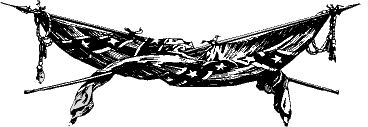In the first part of February a detail of 12 men was made to man 2 guns that had been placed in position in an earthwork at Little Britain on the Stono River, about 6 or 7 miles from camp; on the 8th another was made to relieve the first, and although I had just the day before returned from picket duty and was suffering from injuries received ... I was chosen as one of them ... The men, with the exception of myself as I was suffering no little pain, were in very good humor and when about 1 o'clock it was reported that two gunboats were coming up the river they became much more so ... As the largest boat came, which we afterwards learned to be the "famous" Pawnee, came up we opened on her, the other gun soon following our example, but we did not have to wait long for a return of the complement by her, for she soon showed us what metal she had on board as the 9 inch shells were soon flying thick and fast over our heads; we saw then that we had got into a hornet's nest, for although we kept up our fire as long as we had ammunition left we could judge that we were making little or no impression upon her owing to the imperfect ammunition we had, being 12 pdr Howitzer ammunition while we had an 18 Pounder James gun, the same might have done for small gunboats, but not to attack frigates with that had the advantage with their long range guns. Not very long after opening on her one of the shells from the vessel entered the embrasure of the gun on which I served taking off the top of the head of our Sergent Charles D. Whale, who was just about to sight the gun saying, "Now, boys we will give it to her"; he fell backwards and was, without moving a feature or muscle, dead, his brains scattering all around and upon us; the shell passing on and ploughing the field behind us where it finally exploded. One moment we stupefied by the suddenness of our comrade's death, death, stood still, and then resumed our duties intending, if possible, to avenge him; but alas! After firing 100 rounds our ammunition was exhausted, and almost simultaneously the order was heard "Cease firing!" General Robertson, who had succeeded Gen Hargood, the later being ordered to Virginia, having at last found out I suppose that our firing had no effect upon her. Now we had nothing more to do than crouch down behind the breastwork ... the shells flew as fast as ever often almost covering us up with the sand from the battery as they lodged themselves in it, while the schrapnel buried themselves in all directions around us; add to this the sight of our comrade lying there before us in his gore, and anyone can judge that we had enough to keep our blood at fever heat in spite of the cold. ...
Battle of Fort Sumter
Washington Artillery
Engagement with Frigate Pawnee
Battle of North Carolina/Surrender
Journey of the German Fusiliers
